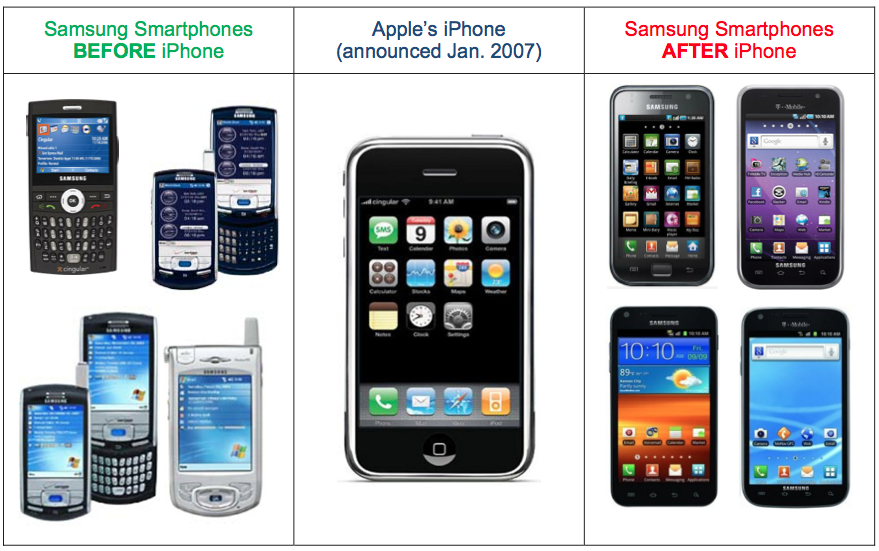In post-trial filings on Friday, Samsung revealed it is planning to fight for a new trial against Apple, and to that end entered a number of documents supporting the theory that juror misconduct led to the jury's original $1 billion verdict.
Samsung's argument leans heavily on juror interviews published directly following the landmark case, especially those regarding the possible insertion of outside evidence into deliberations by jury foreman Velvin Hogan, reports CNET.
In a post-trial interview, Hogan, a patent holder who served on a jury three times before the Apple and Samsung case, said he helped guide the jury through some of the more complex patent issues. Another juror, Manuel Ilagan, confirmed the claims.
"Some were not sure of how prior art could either render a patent acceptable or whether it could invalidate it," Hogan said during an interview with Bloomberg. "What we did is we started talking about one... (I) laid it out for them."
While the statement is not an admission of introducing evidence not presented by Apple and Samsung during the trial's proceedings, it does raise questions as to what exactly was said and how it may have influenced the jury's final decision.
Post-verdict probes into jury deliberations are a rarity, and carries its own federal rule which states, "during an inquiry into the validity of a verdict or indictment, a juror may not testify about any statement made or incident that occurred during the jury's deliberations." However, if "extraneous prejudicial information was improperly brought to the jury's attention," an inquiry can lead to a retrial.
In this case, Samsung is alleging Hogan introduced "extraneous prejudicial information" by mentioning and possibly instructing jurors with his previous patent case experiences. The jury foreman assured presiding Judge Lucy Koh that he would apply the law as per the Court's instruction "and not based on [his] understanding of the law based on [his] own cases."
Samsung cited a number of cases which were overturned due to jury misconduct, however it remains to be seen whether the Korean company can prove that such action was taken during its trial against Apple.
Also in contention is the limited amount of time with which the parties were allowed to argue their respective cases. Judge Koh allotted 25 hours each for testimony and cross examination and an additional two hours for closing arguments. During the trial, Samsung used up most of its time cross-examining Apple's witnesses, leaving little room for the company to mount its own case. Apple, on the other hand, handled their time in a more efficient manner.
"The court's constraints on trial time, witnesses and exhibits were unprecedented for a patent case of this complexity and magnitude, and prevented Samsung from presenting a full and fair case in response to Apple's many claims," the new trial request states.
As Samsung seeks a totally new trial, Apple is moving ahead with its own agenda, and most recently requested another $707 million be added to its $1 billion damages award. The two parties are scheduled to meet again in December to discuss further injunctions and damages related to post-trial motions.
 Mikey Campbell
Mikey Campbell







-m.jpg)






 Charles Martin
Charles Martin

 Malcolm Owen
Malcolm Owen
 William Gallagher
William Gallagher

 Christine McKee
Christine McKee
 Wesley Hilliard
Wesley Hilliard









49 Comments
Place your bets, people! I'm sure its going on right now around Vegas and in Ireland.
Samsung won't get a new trial.
[INDENT][/INDENT] It was already predicted on here that this would happen. That's one of the reasons I like reading the comments. You folk (some of you) seem to be better prognosticators than Michel de Nostredame.
[quote name="mdriftmeyer" url="/t/152857/samsung-requests-new-apple-trial-on-claims-of-jury-misconduct#post_2197733"]Place your bets, people! I'm sure its going on right now around Vegas and in Ireland. [B]Samsung won't get a new trial.[/B] [/quote] That is my bet.
No way that results in a new trial. This sort of thing is just part of the jury process. We all bring our own experience and knowledge to the case. I was on a juror for a federal drug case. The defendant was charged with conspiracy to sell crack cocaine. As you can imagine, the precise definition of what constitutes a conspiracy was very relevant. One helpful juror explained that when she was in college, the head of her sorority said that if any of them got in trouble they all got in trouble; that's a conspiracy. Was that good legal advice? Of course not. Was it inappropriate for her to say that? No, it was just her way of talking through her thoughts. I don't see any difference between that and what Hogan might have said. He thought he had something relevant to the deliberations so he said it. That's not "introducing evidence."
Now if he went home and printed a bunch of stuff from FOSS Patents and used that to explain why Samsung was in the wrong (or if he even was reading about the topic during the trial) THAT would be jury misconduct. Hopefully there will no evidence or suggestion that that happened.
Are you kidding? Samsung will never hand over the money and the lawyers need to milk millions more out of Samsung. Besides, guess who is hosting the Hawaii Golf tournament all expenses paid with spa treatment? The firms that represent Apple and Samsung thats who.